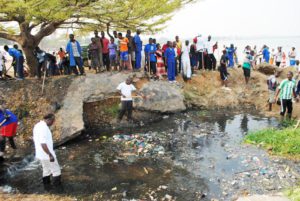Environmental activists warn that Lake Tanganyika is increasingly polluted due to domestic and industrial waste from Bujumbura city and villages that is directly dumped into it without any treatment. Already, as one expert says, locals may be drinking unclean water.

Lake Tanganyika is increasingly polluted due to domestic and industrial waste from Bujumbura city
A. N a mother of four, lives on the edge of Bujumbura where no rubbish collection service operates. She does not want to pollute the river with her family’s waste—four bags every week—but has no option. The only waste collectors in her neighbourhood are young men who work illegally and charge between 1000 and 1500 Burundian Francs to take her bags away. When Iwacu asked her what the young men do with them, she shrugged. “Probably they throw them into the Nyabagera River that crosses our neighborhood,” she said. What she does not know is that in polluting the river, she is contributing to a far more serious problem that could one day affect her: she is polluting Lake Tanganyika, where her drinking water comes from. Experts warn that if domestic and industrial pollution of the lake and its water sources is not stopped, the residents of Bujumbura may cut off their own clean water supply.
In some neighborhoods such as Carama, residents drain water from their showers into the gutters. “We prefer draining water from the showers into these gutters to prevent the septic tank from filling quickly,” says a Carama resident. He says that water from the drains flows into the Nyabagera River.
Tharcisse Ndayiziye, an environmental activist, also a member of the National Observatory of Water and Sanitation says that pollution is among main threats to the Lake Tanganyika. “The lake is mainly polluted by household and industrial waste from the Bujumbura,” says Ndayizeye.
He says that industrial waste should go through the wastewater treatment plant located in Buterere before being dumped in the Lake Tanganyinka. Today all of this wastewater is dumped directly into the lake since Buterere wastewater treatment plant is no longer operating. This is a threat to Lake Tanganyika, according to Ndayizeye.
He says people breed pigs, goats and chickens on the banks of the rivers crossing Bujumbura. “All animal waste ends up being dumped into the lake as these rivers flow into the lake,” he says.
Lake Tanganyika is an important biodiversity reservoir. 40% of its 1,500 species of plants and animals are endemic, meaning that they cannot be found anywhere else on earth.
It is the second largest freshwater lake in terms of volume and, with a depth of 1,470 meters, it is the second deepest lake in the world. At 673 kilometers long, it is the longest lake in the world. Lake Tanganyika also became the “most threatened lake” this year, according to the Global Nature Fund (GNF).
Access to clean water to become problem
Desire Nsengiyumva, Director of Water at the Burundian Company Supplying Water and Electricity (REGIDESO) says Lake Tanganyika is a main reservoir for his company. “We take over 88,000 cubic meters per day—that is more than 90% of the water supplied to the capital of Bujumbura,” he says. He says that if nothing is done immediately to fight against the pollution of Lake Tanganyika, Bujumbura residents will face problems with drinking water.
Ndayizeye calls on the authorities to require all industries operating in Burundi to treat their waste before dumping it into the lake. He says that the authorities must impose strict measures to manage household waste. “Here, waste collected in the city is stored in the dumping ground in Buterere, in the open air. If it rains, and the waste gradually goes in the Lake,” says Ndayizeye. Ndayizeye doubts that the people of Bujumbura consume clean water. “We all know that water is colorless, odorless and transparent. But, often we find that the water in our taps contains dust. So we’re not sure we’re consuming pure water,” Ndayizeye said.



















 IWACU Open Data
IWACU Open Data

